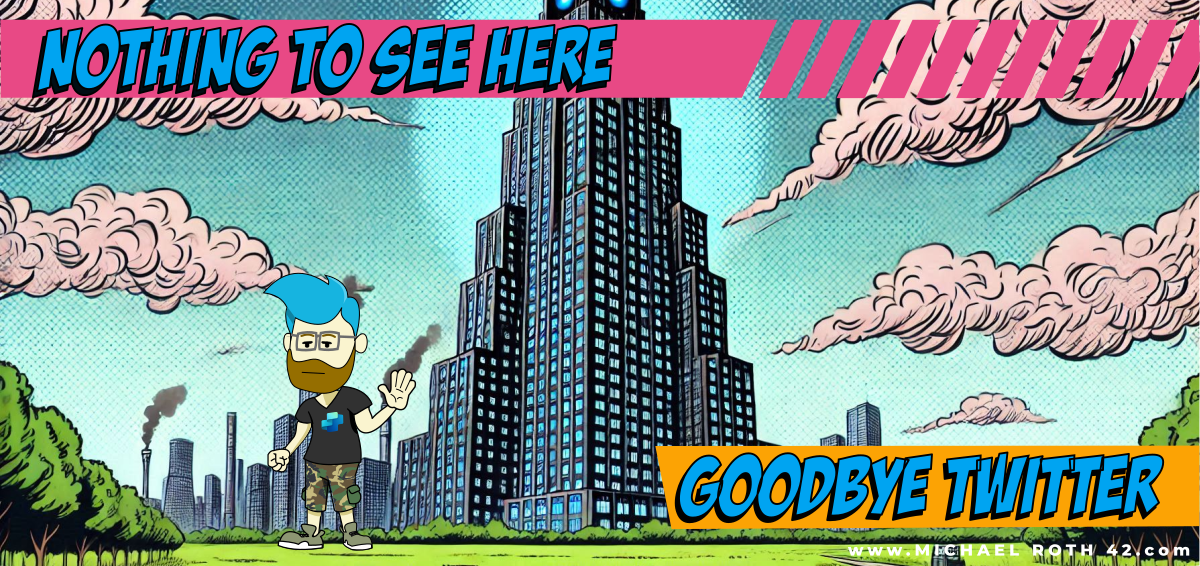Leaving Twitter
This blog is a little different from my usual posts about Power Platform or Governance. Today, I’m stepping back to reflect on a broader topic at the intersection of technology, responsibility, and values. It’s something I’ve been thinking about deeply, and while it’s not my typical focus, I hope you’ll find it thought-provoking. If this resonates with you—or even if you disagree—I’d love to hear your thoughts in the comments. Let’s have a meaningful conversation.
Why I’m Leaving Twitter
Over time, I’ve come to the conclusion that I can no longer stay on Twitter. This decision has been brewing for months, and I’d like to explain why. It’s not just about the changes to the platform—it’s also about the person leading it and the environment it now fosters.
Elon Musk: The Man and His Influence
Elon Musk’s economic and political views are, to me, unacceptable. While he often presents himself as a visionary, his actions and alliances paint a different picture. His public appearances, his alignment with figures like Donald Trump, and his recent overtures to groups like the German AfD (Alternative für Deutschland) reveal a troubling pattern. To me, he comes across as an unreflective individual with an overabundance of wealth and influence, who uses these resources without the introspection or responsibility one might hope for from someone in his position. At his core, Musk is an entrepreneur, and entrepreneurs often chase where the loudest public interest—and profit—lies. However, it has become increasingly clear that he uses his platform, now Twitter, to amplify his own interests, often at the expense of broader societal values. His decisions—both public and behind the scenes—reflect his worldview. The platform’s algorithm, for instance, is seemingly designed to stoke outrage, highlight controversial topics, and drive interactions through divisiveness. This dehumanized approach to content ensures higher engagement but at a cost: the amplification of political and economic biases. The internet is already a place where people can behave without consequences, often leading to ugly and dehumanizing interactions. Musk’s approach has further commodified this ugliness, turning it into a profitable business model. I no longer want to produce content on a platform that thrives on exploiting anger, drama, and division for commercial gain.
The Platform: From Connection to Controversy
Twitter, as it exists today, is no longer the platform I joined years ago. Features like the pay-for-verification model and the prioritization of accounts with blue badges have undermined the credibility of discourse. The removal of robust fact-checking mechanisms allows misinformation to flourish unchecked, and the platform increasingly feels like a breeding ground for misogyny, right-wing hate speech, and general hostility. These features aren’t accidental; they reflect Musk’s own decisions and priorities. The result is a space where hatred, exclusion, and resentment are not just tolerated but encouraged. The system thrives on controversy because it generates clicks—and clicks drive profit. The more divisive the content, the better it performs, creating an echo chamber of negativity. What I see on Twitter now is a relentless stream of hate targeting women, marginalized groups, and those who think differently. The values of inclusion, empathy, and understanding have been overshadowed by the drive to provoke and polarize.
The Loss of Community
When I first joined Twitter, it was a place of discovery and connection. I met fascinating people, exchanged ideas, shared content, and engaged in meaningful discussions. The platform had a unique power to bring communities together, to foster positive interactions, and to showcase the best of what humanity has to offer. There was a lightness and joy in sharing thoughts and ideas with others who genuinely cared about the world and its future. Together, we demonstrated the strength of a community that could inspire change, foster understanding, and spread positivity. But that sense of community has faded. No matter how much I try to focus on the topics and people that inspire me—climate action, sustainability, equality, and the responsible use of technology—I’m met with hostility, toxicity, and rejection at every turn.
Why I’m Saying Goodbye
In theory, I could fight back. I could take a stand, argue my case, and push for better discourse. But the reality is that Twitter is not designed for meaningful conversations or consensus-building. It thrives on anger, arguments, and the endless cycle of controversy that keeps users engaged—and enraged. The platform’s fundamental design is at odds with what I want to achieve. I’m looking for spaces where I can have genuine exchanges of ideas, where discussions can be about listening, learning, and growing—not just scoring points or inflating egos. Twitter no longer offers that. Instead, it amplifies the worst aspects of online interaction, rewarding negativity and division while silencing the possibility of constructive dialogue. So, I’m choosing to leave.
Looking Ahead
This isn’t just about leaving Twitter—it’s about finding spaces that align with my values. I want to engage in discussions about building a better future, with people who are open to real conversations and collaborative growth. I want to be part of communities that prioritize empathy, curiosity, and progress over clicks and controversy.
As I say goodbye to this chapter, I remain hopeful that there are other platforms and communities where these values can thrive. Right now, LinkedIn offers at least an opportunity to share work-related content in a not-harmful way. And honestly, I like how Bluesky is developing so far.
So long, and thank you for the fish 🐟🐠🐡
Thanks a lot for reading, and if you have comments, questions, or remarks, feel free to contact me on social media. I’m happy to chat and help and learn 😉
Michael on Bluesky and LinkedIn
Thank you for reading!
